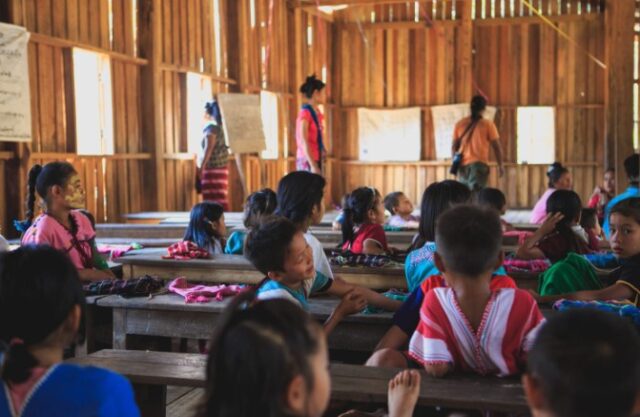The Indonesian Ministry of Education has existed since the beginning of independence, namely in 1945. The name of the Ministry of Education has also changed names, at one time it also used the names of the Ministry of National Education and the Ministry of Education and Culture.
As is known, currently the ministry in charge of education and culture also oversees the field of research and technology (Kemenristek).
The merger of the two ministries led by Nadiem Makarim was formalized at the DPR RI Plenary Meeting in April 2021.
This is different from the era of Ki Hajar Dewantara in the 1945-1950s where the ministry that oversees education was still called the ministry of teaching.
So what is the complete history of the Ministry of Education and Culture from the era of Ki Hajar to Nadiem Makarim? The following review is quoted from the official website of the Indonesian Ministry of Education and Culture.
History of the Indonesian Ministry of Education and Culture from the Ki Hajar Era to Nadiem Makarim:
1. Ministry of Education and Culture at the Beginning of Independence (1945-1950)
The ministry organization at the beginning of independence called the Ministry of Teaching was still very simple. However, awareness has been made to prepare the curriculum.
The first Minister of Teaching in the history of the Republic of Indonesia was Ki Hajar Dewantara. Then during the Syahrir I Cabinet, the Minister of Teaching was entrusted to Mr. Glorious.
In the era of Mr. Your Excellency, various steps have been taken, such as continuing the previous minister’s policy in the field of national-oriented curriculum, improving educational facilities and infrastructure, and increasing the number of teachers.
Then entering the Syahrir II Cabinet, the Minister of Teaching was Muhammad Sjafei until 2 October 1946. Then the Minister of Teaching was entrusted to Mr. Soewandi until 27 June 1947.
During the leadership era of Mr. Soewandi formed the Republic of Indonesia Teaching Investigation Committee chaired by Ki Hajar Dewantara. This committee aims to lay the foundations and structure of new teaching.
2. Ministry of Education and Culture Liberal Democracy Era (1951-1959)
During the Natsir Cabinet which was formed on September 6 1950, the ministry changed its name to the Ministry of Teaching, Education and Culture (PP and K) and appointed Dr. Bahder Johan as minister.
In April 1951, the Natsir Cabinet was replaced by the Sukiman Cabinet and appointed Mr. Wongsonegoro as Minister of PP and K.
Lalu Dr. Bahder Johan served as Minister of PP and K once again, until he was replaced by Mr. Mohammad Yamin, RM. Soewandi, Ki Sarino Mangunpranoto, and Prof. Dr. Prijono.
In this period, education policy was a continuation of the ministerial policy of the previous period. What stands out in this era is the birth of a formal legal umbrella in the field of education, namely the Basic Education Law Number 4 of 1950.
3. Ministry of Education and Culture Guided Democracy Era (1959-1966)
In the First Working Cabinet, 10 July 1959-18 February 1960, the ministry’s status was changed to junior minister. The ministry in charge of education is divided into three junior ministers.
The Junior Minister for Social and Cultural Affairs is held by Dr. Prijono, the Junior Minister for PP and K is held by Sudibjo, and the Junior Minister for Mobilizing People’s Energy is held by Sujono.
4. Ministry of Education and Culture in the New Order Era (1966-1998)
Policies in the field of education in the New Order era were quite numerous and varied considering that this order held power for quite a long time, namely 32 years.
These policies include mandatory P4 upgrading for students, normalization of campus life, student development through OSIS, enhanced Indonesian spelling or EYD, real work courses (KKN) for students, pioneering development schools, and others.
In this era, precisely in 1978, the new school year was shifted to June. The development of educational infrastructure also developed rapidly during the New Order era.
Ministers of education and culture in the New Order era included Dr. Daud Joesoef, Prof. Dr. Nugroho Notosusanto, Prof. Dr. Faud Hassan, Prof. Dr. Eng. Wardiman Djojonegoro, and Prof. Dr. Wiranto Aris Munandar
5. Ministry of Education and Culture Reform Era (1998-2011)
During the time of President Abdurrahman Wahid, the Department of Education and Culture was changed to the Department of National Education by appointing Dr. Yahya Muhaimin as Minister of National Education.
In 2001, when the era of President Megawati’s government began, the Minister of National Education was Prof. Drs. A. Malik Fadjar, M.Sc.
Then in the era of President Susilo Bambang Yudhoyono, the Minister of National Education was Prof. Dr. Bambang Sudibyo, MBA. And Prof. Dr. Ir. Mohammad Nuh.
In 2011 the term department was changed to ministry and in 2012 the fields of education and culture were united again into the Ministry of Education and Culture.
Educational policies in the reform era include changing IKIP into a university, reforming education law with the birth of Law Number 20 of 2003, National Examination (UN), teacher and lecturer certification, School Operational Assistance (BOS), character education, and others. -other.
6. Ministry of Education and Culture After 2011 to Present
After Minister Mohammad Nuh, the position of Minister of Education and Culture was held by Anies Rasyid Baswedan (27 October 2014-27 July 2016).
Then, in the Mutual Cooperation Cabinet era of President Joko Widodo and Vice President Jusuf Kalla, Anies Rasyid Baswedan was replaced by Muhadjir Effendy on July 27 2016.
On October 23 2019, President Joko Widodo inaugurated Nadiem Anwar Makarim as Minister of Education and Culture in the era of President Joko Widodo’s Advanced Indonesia Cabinet and Vice President Ma’ruf Amin.
In the Nadiem era, starting in 2021, the Ministry of Research and Technology was merged with the Ministry of Education and Culture to become the Ministry of Education, Culture, Research and Technology (Kemendikbudristek).
So, that’s the history of the Ministry of Education and Culture from the Ki Hajar Dewantara era at the beginning of independence to the current Nadiem Makarim era.





